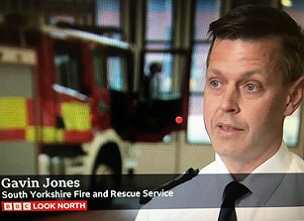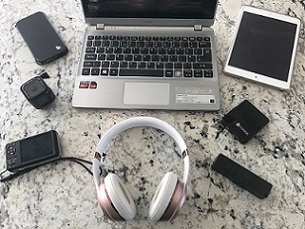

 All these everyday electronic devices are powered by lithium-ion batteries
All these everyday electronic devices are powered by lithium-ion batteries
 An AvSax lithium-ion battery fire containment bag used extensively on aircraft
An AvSax lithium-ion battery fire containment bag used extensively on aircraft
 The last place you want a fire is in the confined space of an aircraft passenger cabin
The last place you want a fire is in the confined space of an aircraft passenger cabin
People are causing more than 200 fires a year costing the UK economy millions of pounds simply by throwing lithium batteries into their general rubbish.
Now firefighters are urging people to make sure they properly recycle batteries to cut down on the needless fires.
South Yorkshire Fire and Rescue Service is one of those who have spoken out and Watch Manager Gavin Jones told BBC News: “When lithium-ion batteries are irresponsibly recycled by getting thrown away and into the waste chain and are crushed, pierced, cracked or dropped there is an effect called thermal runaway. This is where they self-heat and can ignite the materials around them.”
It is now estimated that almost half of all fires at waste centres are started by lithium-ion batteries which equates to 201 fires in the UK every year. The cost to the economy is reckoned to be £158m a year which includes the cost of fighting the fires and cleaning up the environment up afterwards.
Due to the complexity of fighting these blazes it can take days or even weeks to bring the fires fully under control. They burn at incredibly high temperatures and can keep flaring up again.
Lithium batteries power just about everything these days from mobile phones, laptops and e-cigs through to greetings cards, toys and, er, sex aids. Just one crushed battery – even a tiny one – can set fire to rubbish in people’s homes, the waste collection lorry or at the tip.
To reduce the risk simply remove the battery from the device and put it into battery disposal containers at waste centres. Many supermarkets such as Aldi have battery collection tubs where people pack their shopping.
Although all batteries can be recycled, the recycling rate for them is only around 45% meaning 55% - that’s tens of millions of batteries – are being thrown into household waste, causing a potentially massive fire hazard each time.
Dead batteries thrown away with other waste and recycling - known as ‘zombie batteries’- are likely to be crushed or punctured once the waste is collected and processed.
This can cause them to catch fire or even explode and recycling plants are full of highly combustible material such as cardboard and paper so a small fire can quickly become a raging inferno.
When the barrier between a battery’s cathode and anode ruptures it can trigger what is known as thermal runaway which can cause the battery to heat up exceptionally quickly and catch fire.
Thermal runaway happens when one cell in a battery overheats it can produce enough heat – up to 900°C (1652°F) – to cause adjacent cells to overheat. This can cause a lithium battery fire to flare repeatedly.
According to waste and recycling company Veolia: “Up and down the country fires are happening in the back of recycling and waste vehicles and at waste facilities due to the incorrect disposal of batteries. YouGov research has brought to light that shockingly only 43% of the public realise that, if damaged, lithium-ion batteries can spark fires.”
Fires in recycling works can also last for days, causing enormous environmental damage.
In August 2018 there was a huge fire at the Guernsey Recycling site on the Channel island of Guernsey which took 13 hours to douse and is believed to have started when a mechanical claw crushed a lithium battery.
Lithium batteries are a real danger on aircraft. If they go into thermal runaway they will give off toxic smoke and the heat is so intense they could even explode.
This is why thousands of aircraft worldwide carry lithium battery fire thermal containment bags called AvSax devised and manufactured by Environmental Defence Systems Ltd based in Huddersfield, West Yorkshire.
AvSax won the prestigious Queen’s Award for Enterprise in the UK in 2018, the top award any business can achieve.
The company is now using its AvSax technology to make battery fire mitigation bags to be used in the recycling industry.
So far AvSax have been used 33 times on aircraft to deal with emergencies worldwide since the start of 2017 and every time they have been deployed the aircraft has been able to complete its journey safely.
The fires often flare up when electronic items are lost down aircraft seats and then become crushed when the passenger moves them to try to find them. That’s why cabin crew often include in the safety announcement a warning that passengers must alert them if they have lost their mobile phones or other electronic devices in their seats and must not try to retrieve them themselves.
Battery recycling factfile
* All batteries (except car batteries) should be recycled using battery recycling collection points. These are often found in supermarkets, DIY stores, high-street shops and local household waste recycling centres (HWRCs).
* Around 40% of local councils also offer a kerbside collection for used batteries, but these should always be recycled separately to other materials.
* Batteries should always be removed from waste electricals where possible before they are discarded.
* All batteries can be recycled, but the current recycling rate for batteries is around 45% of all batteries placed on the market – meaning that 55% are not currently recycled properly.